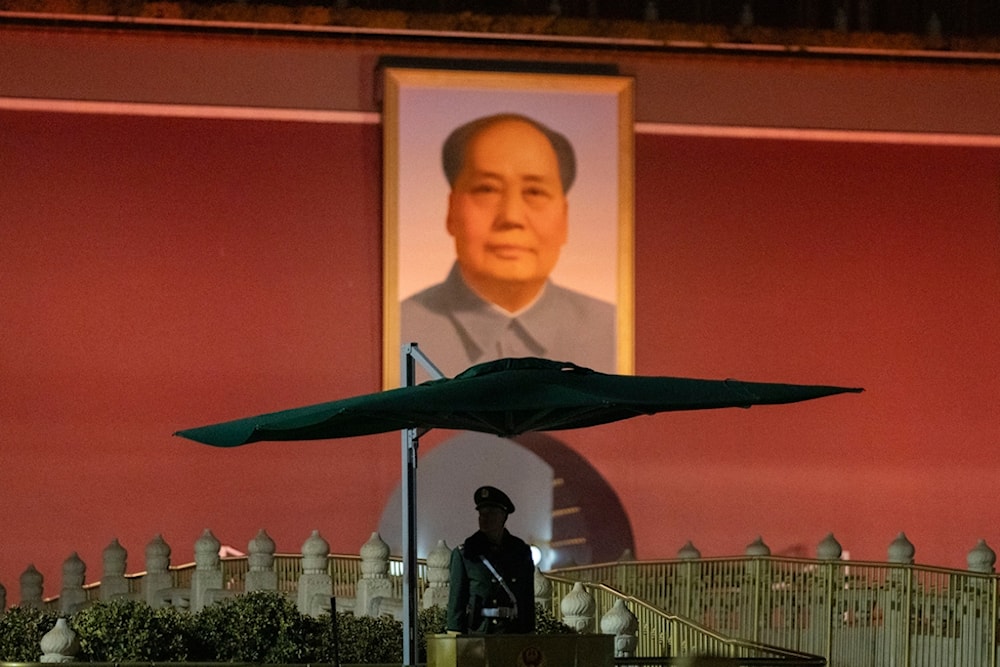China drops 'peaceful reunification' with Taiwan, boosts mil. budget
Over the past decade, China has doubled its military expenditures to fortify its defenses and reunify Taiwan, as it considers it a part of its territory.
-

A Chinese paramilitary policeman stands guard near the portrait of Mao Zedong on Tiananmen Gate before the opening session of the National People's Congress (NPC) in Beijing, China, Tuesday, March 5, 2024 (AP)
On Tuesday, Premier Li Qiang delivered an official report at the opening of the National People's Congress (NPC) revealing that China has boosted its national defense budget by 7.2%, a significant rise since President Xi Jinping doubled it when he took office 11 years ago, in constant efforts to fortify the nation as a result of the Taiwan issue.
In 2013, China's defense budget stood at 720 billion yuan, compared to this year's 1.67 trillion. The increase itself reflects last year's budget and levels higher than China's forecasted economic growth.
In this context, the domestic economic growth target for 2024 equals last year's as well and stands at 5%, the governmental report said.
Despite defense expenditures running beyond the national GDP growth, China was able to sustain its economic stability as its military budget stood at only 1.3% of its overall GDP over the past ten years, a solar at Rajaratnam School of International Studies (RSIS), James Char, said. However, whether this stability is maintained or not depends on China's economic policies for the future.
Regional neighbors and Western nations, prominently the United States, have monitored China's military expenditure consistency throughout the years, and more so recently, as tensions escalate.
The International Institute for Strategic Studies (IISS), based in London, said China has been ballooning its military and defense spending for 30 consecutive years, in attempts to develop its armed forces and defenses.
According to the IISS, the largest monetary allocation of the budget goes to purchasing and producing new military equipment and developing China's arsenal, including drones, missiles, warships, and submarines, all of which could be equipped with built-in nuclear and more conventional warheads, running President Xi's path of full modernization by 2035.
In this regard, Char expected tighter management of military leadership following the development of China's weapon stock and capabilities.
China's most prominent military body, the Central Military Commission, issued an order to repolish the procurement process using the public's help by encouraging the reporting of all irregularities.
China's robustness toward reunification
Regarding the Taiwan reunification, China has consistently affirmed its one-China policy but recently revealed it would be taking a more forceful approach towards it.
The government report exhibited more robust language against Taiwan, and removed all notions of "peaceful reunification". This was not the first time China pulled a similar move, but a clear shift in tone could be regarded, signifying an increasingly firm stance toward Taiwan.
In response, Taiwan's so-called "Mainland Affairs Council" stressed that China must recognize that they are two separate entities, urging China to manifest healthier and more secure exchanges across the separative strait.
So-called Taiwan's defense minister announced that the island would be fortifying its defenses and expediting missile drills and military exercises over the rest of the year.
At the beginning of 2024, in his New Year's address, Chinese President Xi Jinping adamantly declared the reunification of Taiwan inevitable.
"Compatriots on both sides of the Taiwan Strait should be bound by a common sense of purpose and share in the glory of the rejuvenation of the Chinese nation."
Chinese Defense Ministry Spokesperson Zhang Xiaogang stated last month that the procurement of US weapons by the Taipei administration will only bring the danger of war closer but will not stop Taiwan’s reunification with China.
"The leadership of the Democratic Progressive Party (Taiwan's ruling party) is spending money earned by the sweat and blood of the people of Taiwan to buy American weapons in its own interests, this will not stop the trend of complete reunification of the Motherland, but will only push Taiwan into a dangerous situation of a dangerous and terrible war," he added.
He also emphasized that the Chinese military always maintains a high level of combat readiness and will take all measures to stop "Taiwanese independence" plans.
This comes amid growing interference from the United States regarding Taiwanese-Chinese affairs.
A few weeks ago, China criticized a visit by a US delegation to Taiwan as "interference", following the arrival of the House of Representatives committee chairman on China and four other lawmakers in the self-ruled island.
"China always resolutely opposes any form of official exchange between the United States and Taiwan authorities, and resolutely opposes the United States' interference in Taiwan affairs in any way or under any pretext," Foreign Ministry Spokesperson Mao Ning said during a regular press conference.
"We urge the United States to recognize the extreme complexity and sensitivity of the Taiwan issue," Mao said, calling on the US to respect the one-China principle and cease official exchanges with Taiwan.
Read more: US preparing for potential Taiwan conflict: Reuters

 5 Min Read
5 Min Read








